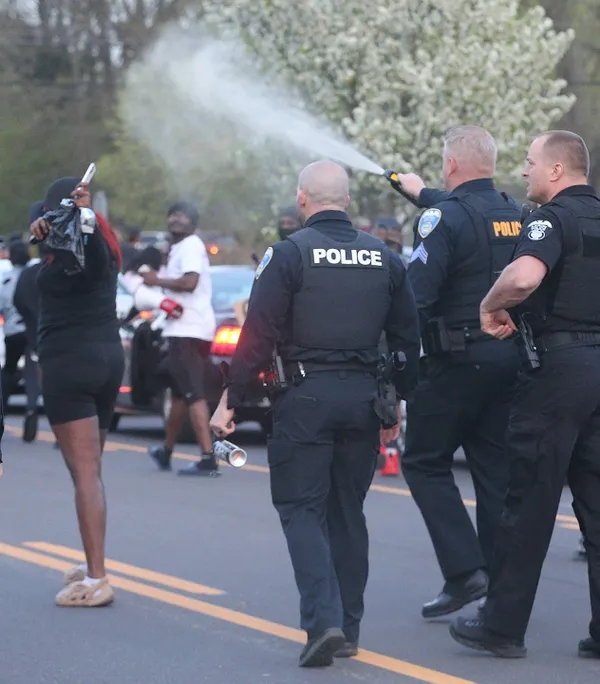Coaches do it. CEOs do it. Teachers do it. Parents do it. And, ideally, elected officials do it. They routinely ask: What worked? What would work better? What failed, and why?
Sometimes the limitations of an approach are revealed when implemented, particularly in situations that are uncommon. An unwillingness to consider that a different response may have yielded better results all but guarantees that past failures will be repeated.
It’s hard to find Akronites who think our current mayor and his administration responded perfectly to last summer’s killing of Jayland Walker by eight Akron police officers.
And yet five days before a grand jury chose not to indict Walker’s killers, mayoral candidate Marco Sommerville claimed the current mayor’s administration, in which he serves as deputy mayor for intergovernmental relations, “handled [the Jayland Walker killing] the best way we could have handled it.” He spoke as if it was all in the past, as if the horror and outrage over Walker’s killing had magically dissipated.
After the grand jury decision, Sommerville issued a call for change that was too little too late. “I do know that community safety and police reform go together, and Akron needs both,” he said. “We need our law enforcement members and our community members to commit to lasting change.”
Wounds left to fester do not heal. Even before the grand jury announced last Monday that they would not indict any of the eight officers who shot Walker, freshly boarded windows downtown signaled the tension that remains 10 months after Walker was shot 46 times.
Peaceful protests understandably resulted in the days after the grand jury’s decision. At a march last Wednesday, reporters filmed police pepper spraying the crowds while also deploying chemical canisters.
Because too many Akron leaders like Sommerville think everything was handled just fine last summer, nothing was learned and here we are again.
In polling, Akronites claim to want new leaders with fresh ideas who will move the city forward. Unfortunately, the May 2 primary likely will be the de facto general election for who becomes Akron’s next mayor as there are no Republican candidates.
Akron mayor’s race:Akron mayoral hopefuls answer citizen questions in latest debate
Is Akron truly ready to pivot to a new direction and away from the stagnant status quo?
Consider the fraught White Pond Drive development. Issues include the viability of the land for housing given the soil’s toxicity and the destruction of wetlands and trees that the city itself identified as essential to managing Akron’s stormwater, pollution and summer heat.
There also are concerns about pursuing high-priced housing on the edge of town when so many neighborhoods in the inner city are filled with vacant lots.
But more concerning was Mayor Dan Horrigan’s peevishness when citizens learned of the secretly planned development and quickly organized against it. Horrigan’s open disdain for these citizens, and the council members who opposed the development, revealed an administration whose members flout accountability to the people they have sworn to serve.
Shortly after the trees on the future development site were cut down, the Beacon Journal informed readers about Section 56, a provision that has been in Akron’s budgets for 57 years. It has effectively given mayors a legal way to work around the checks and balances outlined in the city’s charter, which requires expenditures of $50,000 or more to be approved by City Council.
Learning about Section 56 was an “Ah-ha” moment. With Section 56, the option for a mayor to legally ignore the charter, essentially the constitution of our city, has been baked into every budget for six decades.
As a result, consultants have been paid huge sums to do work that city employees are also paid to do. Contracts are awarded without public bidding. And in the past two years alone, Mayor Horrigan has awarded contracts worth more than $121 million without city council oversight.
That is not good governance, but last month enough members of City Council voted to approve the current budget that contains, yet again, Section 56 with no modifications. Two who voted “yes” were council-at-large members Jeff Fusco and Ginger Baylor. Both are running for re-election and have latched their campaigns onto Sommerville’s.
Last fall, Fusco proposed a City Council resolution opposing citizen-backed police reform. It was directly aimed at thwarting Issue 10, a ballot initiative to create a citizen-led police review board whose members are chosen by City Council. City Council never voted on Fusco’s proposed resolution and in November’s election Issue 10 passed with 62% of the vote.
When City Council voted to seat the members of the police review board earlier this year, Fusco was chief among those opposing Imokhai Okolo, a 27-year-old Black attorney, as one of the board’s nine members. Young Black men are disproportionately the victims of police brutality in this country, making their inclusion on the review board not just important, but essential.
Fusco said he opposed Okolo, who was also opposed by the FOP, because last summer, in the wake of Walker’s killing, the young attorney had referred to police officers who aren’t held accountable for their violence as “pigs” on his Facebook page. Baylor switched her vote from supporting Okolo in early rounds to abstaining in the final round. She and Fusco now have campaign signs listing both their names and Sommerville’s.
Fellow Akronites, reflect on those who are currently in office. Many are honorable servants. But far too many others are comfortable conducting the city’s business in ways that may work for them, but clearly do not work for all the people of Akron. We can move our city forward only by voting for officials who support good governance that includes transparency and sorely needed checks and balances.
New faces with fresh ideas running for mayor and City Council in the May 2 primary can be found at the League of Women Voters voting guide.
This column was first published in the Akron Beacon Journal on Sunday, April 23, 2023.

